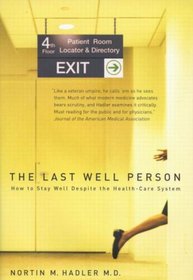kansasmom reviewed The Last Well Person: How to Stay Well Despite the Health-Care System on + 19 more book reviews
Dr. Hadler puts forth convincing arguments that much of the testing (and even interventions) done by doctors in America today is unnecessary because it doesn't really help people live longer or better lives. (He stresses his points do not apply if you are already sick: previous heart attack, etc.) The most important point he makes (I think) is that the testing itself causes repercussions - we feel sicker, we feel more vulnerable, we spend too much time thinking about how we feel instead of living. These repercussions negatively impact our lives to a much greater extent than any positives from the tests themselves.
I was also interested in his thoughts on marketing and advertising for pharmaceuticals and medical testing. All advertising's purpose is to convince us we need something we don't need and I firmly believe medical advertising is no different. He also pointed out the relationships between doctors making recommendations for testing and prescriptions and the companies that own the equipment or medications. It seems like there should be rules against that sort of thing.
I was also interested in his thoughts on marketing and advertising for pharmaceuticals and medical testing. All advertising's purpose is to convince us we need something we don't need and I firmly believe medical advertising is no different. He also pointed out the relationships between doctors making recommendations for testing and prescriptions and the companies that own the equipment or medications. It seems like there should be rules against that sort of thing.




